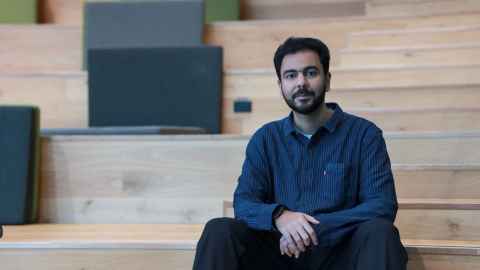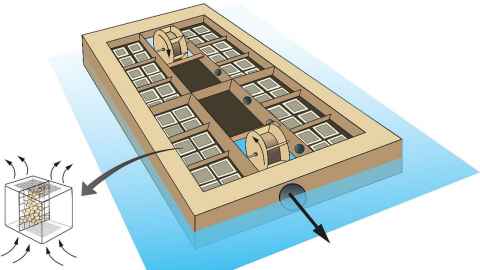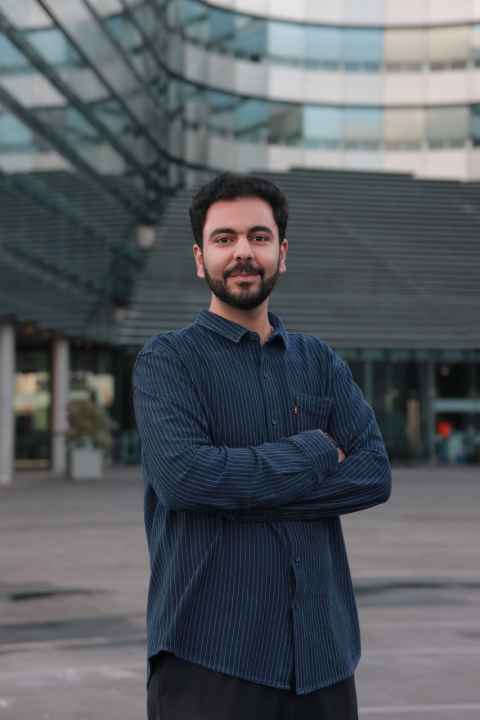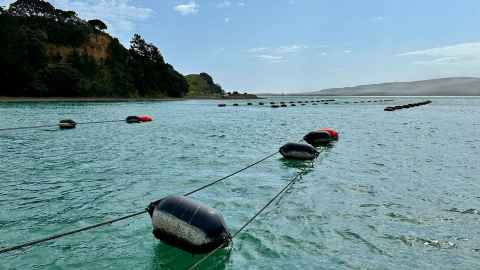Turning the tide on shellfish farming in New Zealand
11 August 2025
A marine energy researcher is building a tide-powered shellfish nursery to boost survival rates for baby mussels, an innovation that could transform the way New Zealand farms its oceans.

Imagine a business where 99.5 percent of the product never reaches the market.
This is the reality for shellfish farming in New Zealand, where billions of juvenile GreenshellTM mussels, known as spat, are naturally lost in the ocean before they grow to market-ready size.
While aquaculture is one of the country’s fastest-growing industries, these losses mean fewer local shellfish on our plates, and millions of dollars lost every year.
One solution is to raise these spat to larger sizes in nursery systems that help them survive the vulnerable early stages of life. These nurseries, called floating upwellers, are floating platforms that keep baby shellfish in mesh containers suspended in water, where nutrient-rich water is pumped over them to help them grow faster.
But powering those pumps with diesel or electricity can be costly and unsustainable.

Mohamed Salman, a doctoral student in engineering with a focus on marine energy harvesting, says it’s "a bit like trying to grow sustainable food with an unsustainable power bill".
That’s why he’s developing a tidally driven nursery system that uses the natural rise and fall of the ocean to move nutrient-rich water to the shellfish, removing the need for fuel or electricity.
"It just lets the tides do all the work to deliver what the spat needs to grow, sort of like an underwater elevator naturally going up and down," he says.

The project, which has received support from the Ministry of Business and Innovation’s Smart Ideas fund, builds on the traditional floating upweller system by adding tidal turbines and floating platforms to work in real marine conditions.
The tidal turbines act like underwater windmills, using the movement of tides to create an upward current that pushes water toward the spat held in containers.
Salman is measuring how water moves through the system, testing how strong and stable the structures are, and adjusting the design to work well in different marine environments.
The project is partnering with Aotea Marine Farms in Kawhia, a mussel spat-catching operation, where they plan to test prototypes of the tidal nursery system in real conditions.

Salman says the system could significantly improve the efficiency and sustainability of shellfish aquaculture in New Zealand.
"Reducing shellfish loss means more sustainable seafood, less pressure on wild stocks, and better income for small-scale farmers in rural communities," he says.
The system’s ability to operate off-grid may also support aquaculture in remote locations, removing a key barrier to expanding shellfish farming in underutilised coastal areas.
Salman’s supervision team includes the project’s principal investigator, Dr Brad Skelton, along with Associate Professor Vladislav Sorokin, Professor Andrew Jeffs, Professor Kean Aw and Dr Michael MacDonald, whose combined expertise spans mechanical engineering, marine science, engineering design, marine ecology and aquaculture systems.
Media contact
Jogai Bhatt | Media adviser
M: 027 285 9464
E: jogai.bhatt@auckland.ac.nz